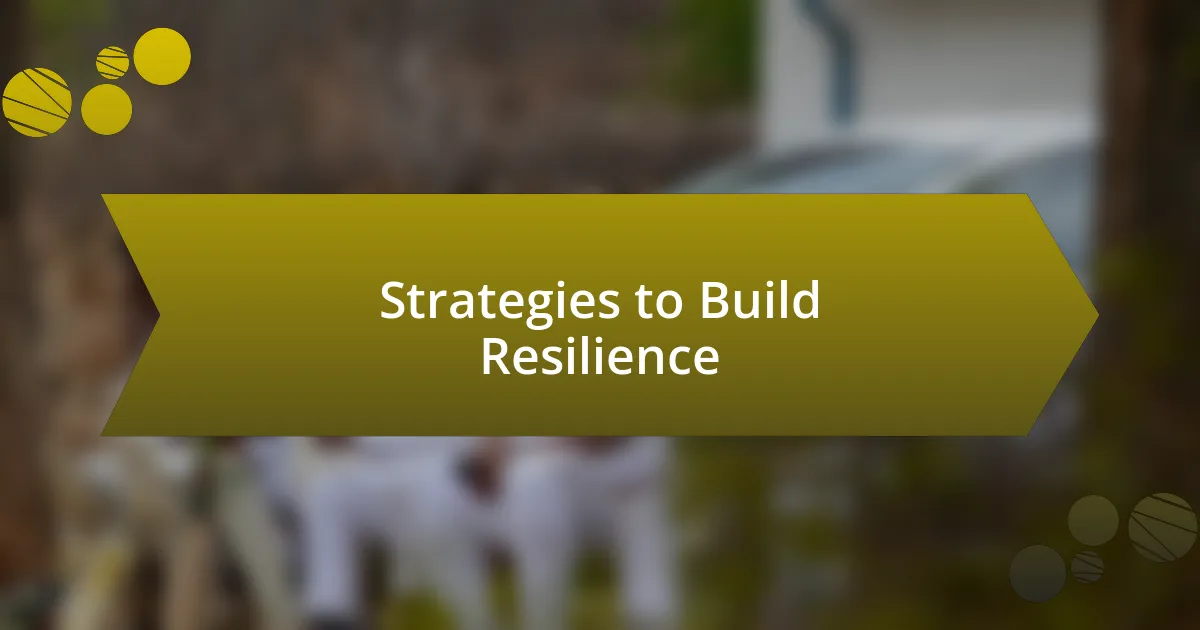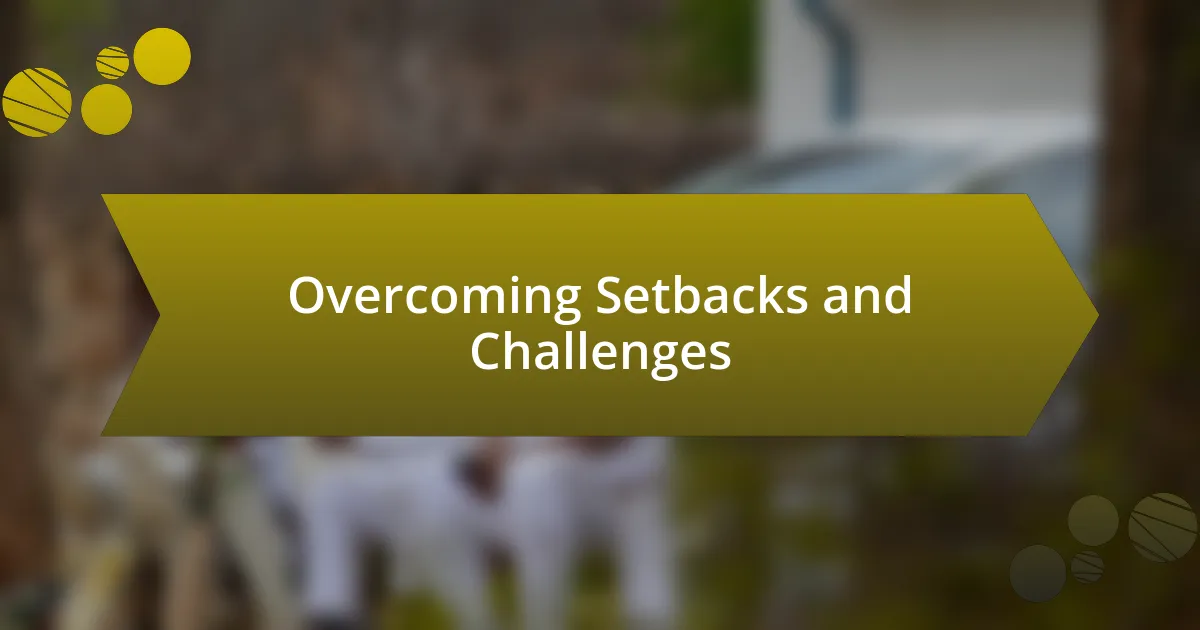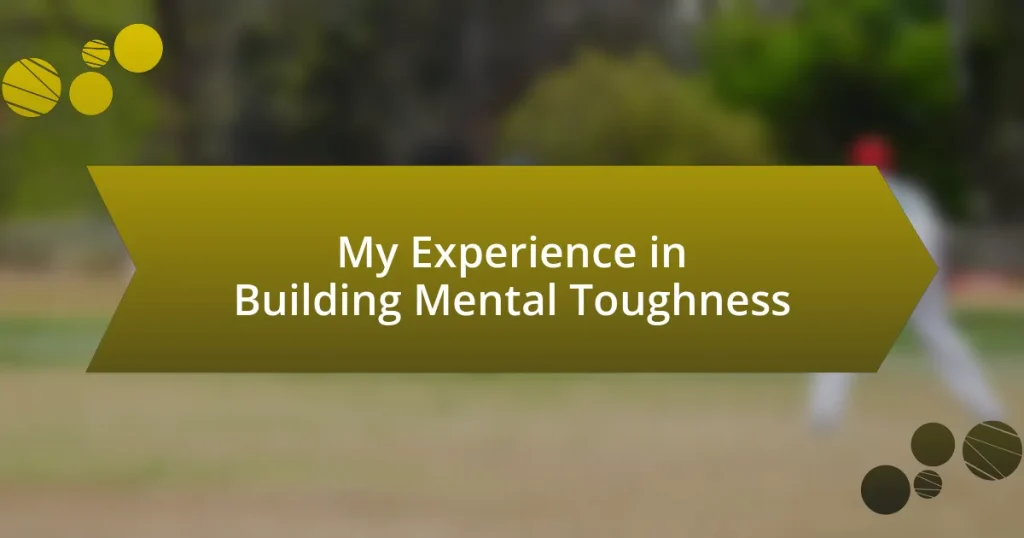Key takeaways:
- Mental toughness involves a mindset that embraces challenges and views setbacks as opportunities for growth.
- Strategies to build resilience include setting realistic goals, practicing mindfulness, and viewing failures as learning experiences.
- Daily practices such as gratitude reflection and self-reflection enhance mental toughness and foster a proactive mindset.
- Measuring mental toughness can be achieved through self-reflection, physical challenges, and seeking feedback from others.

Understanding Mental Toughness
Mental toughness is often described as the ability to persevere through adversity. I remember a time during a particularly tough training session when fatigue set in, and I had to push through. That moment taught me that mental toughness isn’t just about physical endurance; it’s about cultivating a mindset that embraces challenges and views setbacks as opportunities for growth.
What strikes me is how mental toughness can be cultivated in everyday situations. Have you ever found yourself in a tough spot at work or in a social setting? I recall once facing a daunting presentation; my anxiety felt paralyzing. Yet, by focusing on my preparation and reframing my fear as excitement, I was able to shift my mental state. This shift not only helped me cope but also enhanced my performance, illustrating that mental toughness can be developed through consistent practice and self-reflection.
In my experience, understanding mental toughness also involves recognizing its emotional components. It’s not just about grit but incorporating self-compassion during tough times. How often do we judge ourselves harshly after a failure? I learned that acknowledging my feelings instead of suppressing them allows me to bounce back more robustly. Each time I do this, I strengthen my resilience, revealing that mental toughness is as much about emotional intelligence as it is about mental strength.

Importance of Mental Toughness
Mental toughness is crucial in navigating life’s challenges, as it equips us with the resilience needed to tackle obstacles head-on. Reflecting on my first marathon, I vividly recall the moment midway when self-doubt crept in. Battling both physical pain and my wavering thoughts, I realized that my determination to finish was rooted in my mental strength. It was the culmination of training, mindset shifts, and believing in my capacity to overcome. This experience highlighted how mental toughness is ultimately a cornerstone for achieving long-term success.
Additionally, mental toughness plays a significant role in maintaining motivation during isolated phases, whether in sports, studies, or our careers. I remember a period of pursuing a challenging certification, where distractions abounded, and my focus wavered. The ability to remain steadfast, pushing through the monotony, was not only a test of will but a testament to my mental resilience. This timeframe taught me that mental toughness fosters self-discipline, making it easier to stay aligned with our goals even when external factors are less than supportive.
Finally, the importance of mental toughness goes beyond personal endeavors. It fosters stronger relationships by enabling us to communicate effectively under stress. A while back, a disagreement with a close friend turned heated, testing our bond. Choosing to remain calm and listen, rather than react impulsively, allowed us to navigate that conflict maturely. I learned that mental toughness is essential to emotional stability, shaping how we support our loved ones when they face their own trials.
| Aspect | Example |
|---|---|
| Perseverance | Overcoming self-doubt during challenges like a marathon |
| Motivation | Staying focused while preparing for a certification |
| Communication | Navigating conflict through calmness in relationships |

Strategies to Build Resilience
Building resilience is an ongoing journey, and I’ve found several strategies that have helped me immensely. One effective approach is to embrace challenges as opportunities for growth. During a particularly tough point in my career, I opted to lead a project that was outside my usual expertise. Initially, I felt overwhelmed, but stepping out of my comfort zone taught me invaluable lessons about my capabilities and reinforced my belief in myself.
Here are some strategies I’ve employed to build resilience:
- Set Realistic Goals: Break down larger objectives into manageable steps. This keeps me motivated and focused on gradual progress.
- Practice Mindfulness: Engaging in mindfulness exercises not only calms my mind but also helps me to respond to stressors with a clearer perspective.
- Cultivate a Support Network: Surrounding myself with positive and supportive individuals has been a key factor. They encourage me and provide a sounding board during difficult times.
- Learn from Failure: I’ve learned to view failures not as setbacks but as instructive experiences. This shift in mindset has empowered me to tackle future challenges with confidence.
- Maintain a Healthy Lifestyle: Regular physical activity and balanced nutrition boost my mood and energy levels, making me more resilient in the face of adversity.
Incorporating these strategies not only fosters resilience but also nurtures a deeper understanding of oneself. Reflecting on past experiences reinforces my growth and inspires me to keep pushing forward.

Daily Practices for Mental Toughness
Daily practices are vital for cultivating mental toughness, and I’ve personally incorporated a few simple yet transformative habits into my routine. One of those habits is starting each day with a brief morning ritual. I take a moment to reflect on what I’m grateful for, which has a profound impact on my mindset. How often do we rush into our days without pausing to appreciate what we have? This small act sets a positive tone, allowing me to face challenges with a clearer perspective.
Another practice I’ve found useful is embracing discomfort. I often push myself to engage in activities I would typically avoid, whether it’s a tough workout or a challenging conversation. I recall a time when I decided to lead a group discussion at work on a controversial topic that I was unsure of. Initially, it felt daunting, but finishing that meeting made me realize that confronting discomfort head-on builds my confidence and resilience. Isn’t it interesting how stepping out of your comfort zone can redefine your limits?
Finally, I prioritize self-reflection in the evenings. Before bed, I take a few minutes to assess my day—what went well, what didn’t, and what I could improve upon. This practice has been incredibly insightful, allowing me to adapt and grow continuously. It’s a straightforward question: when was the last time you took a step back to evaluate your experiences? This reflection not only aids in processing emotions but also fosters a proactive mindset, ensuring that I am always evolving on my journey toward greater mental toughness.

Overcoming Setbacks and Challenges
Experiencing setbacks is an inevitable part of life, and I’ve found they can be powerful teachers. One particularly challenging moment for me was when I faced a significant professional rejection. At first, it felt like a punch to the gut, but rather than letting it defeat me, I took it as an opportunity to reassess my approach. Have you ever had a setback that forced you to reevaluate your path? I learned that each rejection brought me closer to discovering my strengths and weaknesses.
Another time that stands out was during a challenging personal relationship. The breakdown was painful, and I struggled with feelings of inadequacy. However, through this process, I learned the importance of vulnerability and communication. Isn’t it fascinating how challenges can force us to confront our deepest fears? Instead of closing myself off, I decided to engage in open conversations, which ultimately deepened my connections with others and reinforced my emotional resilience.
In practice, I’ve found that reframing setbacks can transform them into stepping stones rather than stumbling blocks. After I withdrew from a failed project, I took a step back and asked myself what I could learn from the experience. This shift in perspective has been monumental in my ability to bounce back. How about you? Could viewing your challenges differently empower you to move forward? Embracing setbacks as learning experiences cultivates a mindset of growth and grit, essential for building mental toughness.

Measuring Your Mental Toughness
Measuring mental toughness can be both subjective and objective, depending on how one approaches it. Personally, I’ve found that self-reflection plays a critical role. For example, I rate myself on a scale of 1 to 10 after challenging situations, like when I faced intense pressure during a demanding project. This simple act of introspection allows me to gauge how well I handled stress and ran the race of endurance.
I also believe physical activities can serve as a litmus test for mental resilience. Engaging in activities like long-distance running has helped me measure my mental stamina. There were moments when I felt my legs giving out, but pushing through those last few miles taught me the importance of perseverance. Have you ever pushed yourself physically just to see how far you can go? This is where I realized that mental toughness often mirrors physical challenges; pushing through discomfort can reveal our true strength.
Another effective method I’ve discovered for measuring mental toughness involves seeking feedback from friends or mentors. One time, I asked a close colleague how they perceived my reactions during high-stress meetings. Their insights provided me with a clearer picture, revealing areas I needed to work on. Isn’t it interesting how others can often see what we might overlook in ourselves? Understanding one’s mental toughness is more than just personal assessment; it’s about gathering a holistic view from various perspectives and using that feedback to spur growth.

Applying Mental Toughness in Life
Applying mental toughness in life transforms challenges into opportunities for growth. I’ve faced moments where doubt crept in, like when I had to deliver a tough presentation. I felt a surge of anxiety, yet I reminded myself of past successes and pushed through. It became clear that embracing discomfort head-on not only bolstered my confidence but also enabled me to enjoy the process more.
I’ve also discovered that maintaining mental toughness requires a consistent routine. For instance, I started journaling daily to document my thoughts and feelings. This practice allowed me to connect deeply with my emotions and identify patterns that needed addressing. Isn’t it fascinating how writing can clarify our thoughts and strengthen our resolve? By understanding my reactions, I became better equipped to handle stress, making everyday hurdles feel less daunting.
Additionally, surrounding myself with positive influences has been crucial. I remember a time when a supportive friend encouraged me to tackle a daunting project instead of shying away from it. Their belief in me cultivated my own self-belief, demonstrating that mental toughness flourishes in a nurturing environment. Have you ever noticed how the right words can ignite a spark within? This dynamic goes both ways; as I uplift others, I find my own resilience growing stronger.













